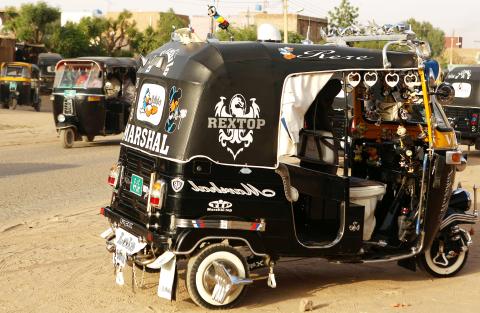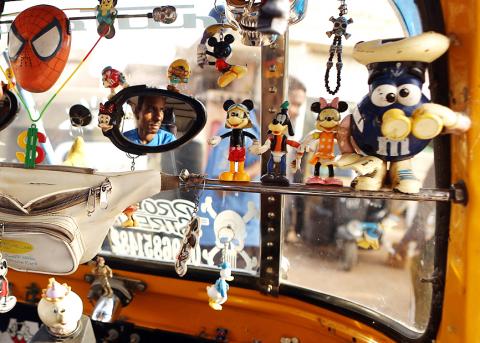With more a splutter than a roar, Baha al-Din Yassin — alias “The Tiger” — tears off down Khartoum’s sand-lined streets in his three-wheeled motor rickshaw on the prowl for fares.
With his tiger-stripe seats, a tiger’s head painted on his windscreen, “TIGER” spelled in Arabic across the back of his rickshaw and a stereo blasting out Bob Marley, Baha has spent more than a month’s wages on his wheels — and he does not even own them.
“I just rent it for 50 Sudanese pounds [U$$8.40] a day,” the Tiger said, scanning the streets for prospective customers from behind a pair of wraparound shades.

Photo: AFP
With thousands of the Indian-built, tin tuk-tuks on Khartoum’s streets, as well as a fleet of aging yellow taxis and battered minibuses, the competition is fierce.
However, the Tiger belongs to a select group of rickshaw drivers prepared to fork out weeks worth of pay on their vehicles, despite being among the lowest paid in a country where the average GDP per capita is just US$4 per day.
“The work depends on how nice the rickshaw looks,” the Tiger said, smiling from behind his sunglasses.

Photo: AFP
On average, he makes between 80 and 150 Sudanese pounds per week, but thought nothing of spending 1,000 Sudanese pounds decorating his hot-rod tiger tuk-tuk.
“If the rickshaw is good, the work is good,” he grinned.
He is convinced that his tiger motif, taken from the name of the rickshaw’s lawn-mower strength, would bring in more fares.
The Tiger’s unique style has won him loyal customers.
Aklilu Ghebre Michael, a slight teacher of Eritrean origin, regularly uses the Tiger’s rickshaw.
“I like the design and the safety of it,” he said, as the Tiger bumped around Khartoum’s pot-holed streets.
Although their small size means they can nip through the jams clogging Khartoum’s main roads, the tuk-tuks are also accident prone.
However, a driver who has spent more money on his rickshaw is likely to take better care of it and drive safely — or so the thinking goes.
“I feel safer than in the other rickshaws that I use,” Michael said.
And the drivers’ insistence on spending their hard-earned cash has generated big money for the men who make a living modifying the rickshaws.
On a sun-baked road running through the Sahafa neighborhood, a handful of workshops that customize the motor rickshaws has sprung up.
Mohammed al-Zubayr has built a thriving business refitting rickshaws and now employs seven men.
Outside his workshop, al-Zubayr — nicknamed Tamody — says souping up their vehicles is a wise investment for the drivers.
“The customers stop the nice rickshaws. People prefer rickshaws which have cassettes and accessories, nice lights,” he said, as more rickshaws spluttered off the main road and on to the forecourt behind him.
Many just want new covers for their seats, while others want wheel spikes attached, or stereo systems fitted behind the seats.
Tamody is happy to oblige, but some requests have proved too much for him.
“Some of them want to put air-conditioning inside their rickshaw, or close it completely to protect it from the rain,” he said.
Darting from rickshaw to rickshaw lined up outside, the stockily built Tamody recalled some drivers had even asked him to fix satellite dishes to the canvas roofs so they can watch television as they drive.
There is another reason that some drivers plow their hard-won earnings into their rickshaws — despite many not owning them, Tamody said.
“They have to make it look nice for them to drive in a good mood, even if it costs money,” he said, before turning his attention to another tuk-tuk.
The drivers work long hours in the dusty air and searing heat of Khartoum, without any guarantee of a set wage.
Still buzzing around the city’s streets, reggae playing from a speaker in the back, the Tiger said he has managed to make his work bearable.
“Your rickshaw is like your house,” Tamody said. “If you treat your rickshaw like your house, then you can work in comfort.”

The US dollar was trading at NT$29.7 at 10am today on the Taipei Foreign Exchange, as the New Taiwan dollar gained NT$1.364 from the previous close last week. The NT dollar continued to rise today, after surging 3.07 percent on Friday. After opening at NT$30.91, the NT dollar gained more than NT$1 in just 15 minutes, briefly passing the NT$30 mark. Before the US Department of the Treasury's semi-annual currency report came out, expectations that the NT dollar would keep rising were already building. The NT dollar on Friday closed at NT$31.064, up by NT$0.953 — a 3.07 percent single-day gain. Today,

‘SHORT TERM’: The local currency would likely remain strong in the near term, driven by anticipated US trade pressure, capital inflows and expectations of a US Fed rate cut The US dollar is expected to fall below NT$30 in the near term, as traders anticipate increased pressure from Washington for Taiwan to allow the New Taiwan dollar to appreciate, Cathay United Bank (國泰世華銀行) chief economist Lin Chi-chao (林啟超) said. Following a sharp drop in the greenback against the NT dollar on Friday, Lin told the Central News Agency that the local currency is likely to remain strong in the short term, driven in part by market psychology surrounding anticipated US policy pressure. On Friday, the US dollar fell NT$0.953, or 3.07 percent, closing at NT$31.064 — its lowest level since Jan.

The New Taiwan dollar and Taiwanese stocks surged on signs that trade tensions between the world’s top two economies might start easing and as US tech earnings boosted the outlook of the nation’s semiconductor exports. The NT dollar strengthened as much as 3.8 percent versus the US dollar to 30.815, the biggest intraday gain since January 2011, closing at NT$31.064. The benchmark TAIEX jumped 2.73 percent to outperform the region’s equity gauges. Outlook for global trade improved after China said it is assessing possible trade talks with the US, providing a boost for the nation’s currency and shares. As the NT dollar

The Financial Supervisory Commission (FSC) yesterday met with some of the nation’s largest insurance companies as a skyrocketing New Taiwan dollar piles pressure on their hundreds of billions of dollars in US bond investments. The commission has asked some life insurance firms, among the biggest Asian holders of US debt, to discuss how the rapidly strengthening NT dollar has impacted their operations, people familiar with the matter said. The meeting took place as the NT dollar jumped as much as 5 percent yesterday, its biggest intraday gain in more than three decades. The local currency surged as exporters rushed to